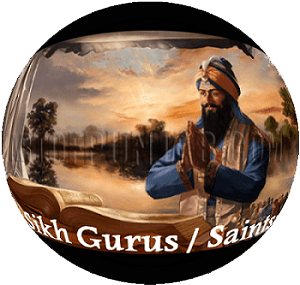- Guru Granth Sahib Authors & Contributors -
The writings of the Gurus appears chronologically. Each of the Gurus signed their hymns as Nanak. Their compositions are identified by the numerals at the beginning of each hymn, ie. Mahalla 1 is Guru Nanak, Mahalla 2 is Guru Angad and so on. These are then followed by those of other saints (Bhagtas) and other contributors. Their are 3,384 hymns found in the Guru Granth Sahib broken down by author are:
The Gurus -
- Guru Nanak: 974 hymns including sloks and pauris
- Guru Angad: 62 sloks
- Guru Amar Das: 907 hymns including sloks and pauris
- Guru Ram Das: 679 hymns including sloks and pauris
- Guru Arjan: 2,218 hymns including sloks and pauris
- Guru Tegh Bahadur: 59 hymns and 56 sloks
- Guru Gobind Singh: 1 slok
The Bhagatas: Saints of various faiths
- Kabir: 292 hymns Bhagat Kabir (1398 to 1495) was born to a Brahmin mother and raised by a muslim step mother. Bhagat Kabir was a proponent of the Bhakti movement. He lived as a householder, abhored the caste system and religious rituals. He was an saintly apostle of peace, love and unity and a great poet. Bhagat Kabir believed in inward purity, and was respected by both Hindus and Muslims.
- Namdev: 60 hymns Bhagat Namdev (1270 to 1350) was a celebrated saint from Maharashtra who travelled extensively across the country. He lived in Punjab for a number of years.
- Ravidas: 41 hymns A contemporary of Bhagat Kabir and a disciple of Bhagat Ramanand, Bhagat Ravidas represents the culmination of the Bhakti Movement. He came from a low caste cobbler family but had many desciples because of his spirituality. He stressed a life of simplicity and piety.
- Sheikh Farid: 4 hymns and 130 sloks Sheikh Farid (1175 to 1265) was a muslim Sufi saint of great piety. He is considered the father of Punjabi poetry. He was greatly loved for his kindness and humanity. He stressed living a simple yet purposeful life concentrating on One God.
- Trilochan: 4 hymns A contemporary of Bhagat Kabir and a celebrated sain of the Vaish caste. He believed in One God and condemned superficial rituals and stressed the holiness of the heart.
- Dhanna: 4 hymns Bhagat Dhanna was a Jat from Rajasthan who was born in 1415. He lived most of his life as an idol worshipper but in later years became a worshipper of One God and renounced all superstitious practices.
- Beni: 3 hymns Probobly a contemporary of Bhagat Namdev, not much is known about him. He was unperturbed by poverty and enjoyed a life of solitude enriched by his spiritual persuits. He was a great scholar as is evident from his writings.
- Sheikh Bhikan: 2 hymns A muslim Sufi scholar saint Sheikh Bhikan died in the early part of Akbar's reign. He was one of the most learned men of his time. He believed that only God's name can heal a diseased mind and body.
- Jaidev: 2 hymns Bhagat Jaidev was a renowned poet laureate in the royal court of king Lakshman Sen of Bengal. His famous work of peotry Gita Govinda is well known for its poetic beauty and musical richness.
- Surdas: 1 hymn Bhagat Surdas was a Brahmin born in 1529. He was learned in Sanskrit and Persian and studied music and poetry. He was appointed a governor by emperor Akbar, but was later imprisoned for dereliction of duty. Towards the end of his life, he became a hermit and lived among holy men.
- Parmanand: 1 hymn Born in Maharashtra, little is known about Bhagat Parmanand's life. It is believed that he lived in Maharashtra and was aotee of Krishna. He later became a proponent of One God.
- Pipa: 1 hymn Born in 1425, Bhagat Pipa was the king of the princely state of Gagaraungarh. He abducated his throne, travelled extensively and became a disciple of Bhagat Ramanand. He lived a life of extreme austerity and humility.
- Ramanand: 1 hymn Bhagat Ramanand, a Brahmin was born in 1359 in Madras. He is regarded as the pioneer of the Bhakti movement in northern India. A Vaishnava in his early life, he became a worshipper of brahm and condemned the caste system. Bhagat Kabir was the most renowned amongst his disciples.
- Sadhna: 1 hymn A butcher by profession, Bhagat Sadhana was born in Sind. His piety and meditation of God elevated him to saintly status. He was condemned by Brahmins and on a false charge was arrested and buried alive.
- Sain: 1 hymn Bhagat Sain was a barber of the royal court of Raja Ram, king of Rewa. He was a follower of Bhagat Ramanand and Bhagat Kabir.
The Bhatts
The Bhatts were a group of musicians who lived in the sixteenth century. All of them were scholars, poets and singers.
- Kal: 49 Swayyas
- Kalsahar: 4 Swayyas
- Tal: 1 Swayya
- Jalap: 4 Swayyas
- Jal: 1 Swayya
- Kirat: 8 Swayyas
- Sal: 3 Swayyas
- Bhal: 1 Swayya
- Nal: 6 Swayyas
- Bhikha: 2 Swayyas
- Jalan: 2 Swayyas
- Das: 1 Swayya
- Gayand: 5 Swayyas
- Sewak: 7 Swayyas
- Mathura: 10 Swayyas
- Bal: 5 Swayyas
- Harbans: 2 Swayyas
Sikhs -
- Mardana: 3 sloks Baba Mardana was a rabab (rebeck) player who spent most of his life as a disciple and musician of Guru Nanak. Born a Muslim, Baba Mardana was a childhood friend of Guru Nanak and accompanied him on all his great travels.
- Satta and Balwand: 1 Var Satta was a rebeck player who served Guru Angad, Guru Amar Das, Gur Ram Das and Guru Arjun. Along with his fellow musician Balwand they jointly composed a ballad which appears in the Guru Granth Sahib.
- Sunder: 1 hymn Baba Sunder (1560-1610) was the great grandson of Guru Amar Das. His composition called Sadd (Calling) was written at the request of Guru Arjun after the death of Guru Ram Das.







